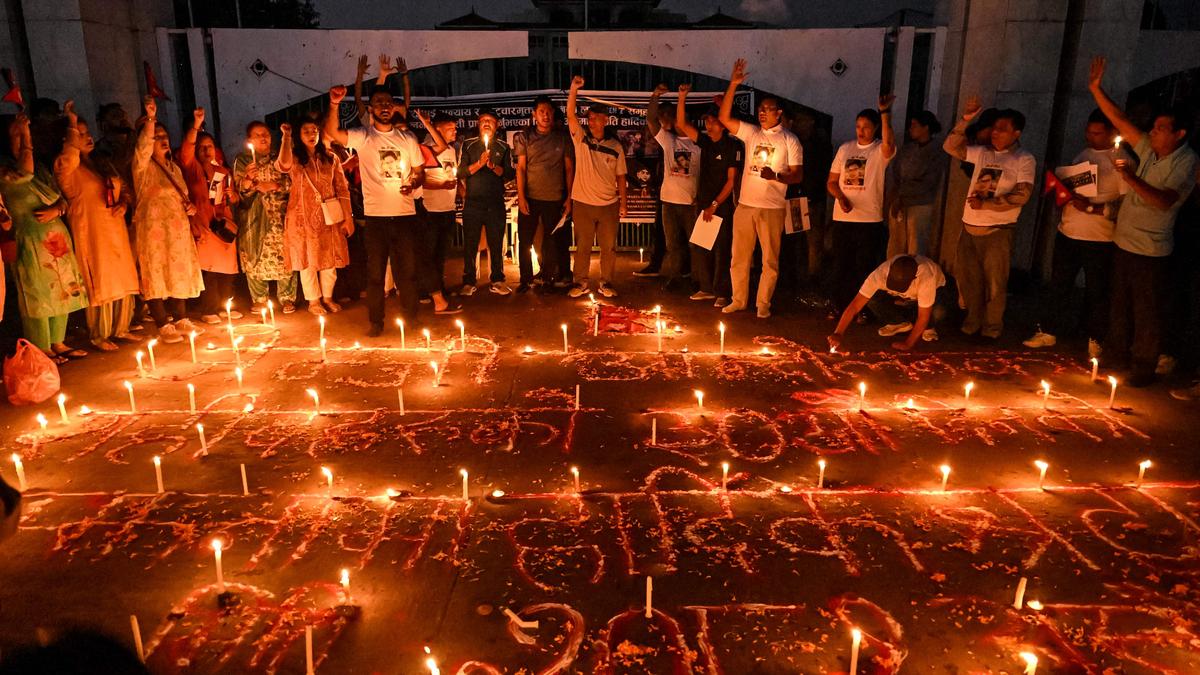
Thursday (October 9) marked a month since Nepal, especially the capital Kathmandu, witnessed anarchy. On September 9, a day after the youth-led protests, then Prime Minister K.P. Sharma Oli resigned and fled to an army barracks following the deaths of 19 young people. The Nepali capital saw events of an unprecedented degree — the Parliament, government complex, and the Supreme Court burned till late into the night.
Since September 12, an interim Cabinet led by former Chief Justice Sushila Karki has been in place, with the mandate of holding elections on March 5. The official death toll of the two-day protests stands at 75.
The month since the protests has been uneasy, punctuated by festival holidays and rain-induced disasters. A proposed protest plan by a youth group for October 9 stirred fresh anxiety, though it was ultimately withdrawn a day before after some groups dissociated themselves. One youth group also demanded the resignation of the chief and members of the Commission for the Investigation of Abuse of Authority — Nepal’s top constitutional anti-graft agency.
These youth groups, broadly dubbed under the umbrella of Gen Z, led last month’s demonstrations, which were triggered by a social media ban and driven by anger at corruption and misrule. Now, they appear scattered and fragmented, which analysts say was inevitable given their structureless and leaderless nature.
However, campaigners argue that lacking formal leadership is not a flaw.
Raskshya Bam, who organised and participated in the protests, said the youth took to the streets with specific demands — ending corruption and rolling back the social media ban.
“But as the situation unfolded, we are where we are today,” Ms. Bam, 26, said. “Everyone must realise the spirit of the protests… reform in a nutshell. Now the interim government is there with the mandate to hold elections, and that should be the goal.”
She expressed no qualms about different groups raising various demands, calling it natural for youth to have differing voices.
Government in a bind
As anarchy descended on Kathmandu on September 9 — with overwhelmed security agencies unable to maintain law and order — the Nepal Army stepped in not only to secure the capital but also to facilitate dialogue with President Ram Chandra Poudel.
It was at Army Headquarters that youth campaigners finalised Ms. Karki’s name after she won a vote on the digital platform Discord, a virtual public square for Gen Z, where they planned their protests.
Analysts describe this interim administration as hastily stitched together, backed by Gen Z but lacking solid political ground. Within hours of her oath, Prime Minister Karki dissolved the House of Representatives.
“A lack of political nature is the biggest challenge of this government,” said Keshav Dahal, a writer and political commentator. “The government and political parties appear to hold each other in deep contempt, which is likely to spoil the environment for elections.”
Nepal’s traditional parties, consigned to the back foot after the protests, are now resurfacing.
Deposed Prime Minister Oli addressed his party members on Thursday, dismissing the current government.
“Many say we have to wait till March 5 and should demand the restoration of the House if elections do not take place,” he told them, hinting at moving the Supreme Court for reinstatement of the House. “The House dissolution is unconstitutional, illegal, and undemocratic.”
His remarks come amid political parties’ refusal to commit to the March 5 elections. Concerns mount over whether the elections will take place as scheduled — and if they do, whether they will carry legitimacy if major parties boycott.
Gen Z campaigners say it’s incumbent on everyone to work towards protecting democracy.
“The interim government needs support from all sides — citizens, civil society, intellectuals, and political parties — to conduct timely elections,” said Ms. Bam. “After all, our protests did not mean — and we do not wish — to prohibit parties. They are key constituents in a multi-party democratic set-up.”
Political tensions
As the country eyes elections, accusations and counter-accusations are flying. Last week, social media buzzed with calls to arrest Mr. Oli and Ramesh Lekhak, who was Home Minister when 19 protesters were killed.
After an initial refusal, police agreed to accept complaints filed by those injured during the protests against Mr. Oli and Mr. Lekhak, with the caveat that the case would be forwarded to a judicial commission investigating the September 8-9 incidents. But the commission, led by a former judge, on Thursday sent the case back to police, saying investigation authority lies with the state apparatus.
Meanwhile, a student wing affiliated with Mr. Oli’s Communist Party of Nepal (Unified Marxist-Leninist) seeks to file a treason complaint against Balendra Shah, Kathmandu Mayor, and Sudan Gurung, a self-styled Gen Z leader.
Mr. Shah, who won Kathmandu mayoral elections independently, is held in contempt by political parties. He expressed support for Gen Z protests and endorsed Ms. Karki’s appointment as PM. Mr. Gurung leads Hami Nepal, an NGO. Though a millennial, Mr. Gurung has emerged as a self-styled Gen Z leader — a fact raising eyebrows among both critics and campaigners.
Economic costs
For a country already struggling economically, last month’s protests dealt a heavy blow. The World Bank revised Nepal’s growth forecast to 2.1% for fiscal year 2025–26, down from the earlier 5.4%.
In its South Asia Development Update, the multilateral agency said the September 8–9 unrest deepened political and economic uncertainty in Nepal. It warned that international tourist arrivals are likely to see a sharp drop, and weakened investor confidence could slow private investment.
The Hotel Association of Nepal estimates losses to the hotel industry at NRs. 25 billion (USD 176 million).
Path fraught with challenges
Analysts say the government faces a narrow window and a full plate.
Yug Pathak, writer and analyst, says the government can prove its legitimacy only by holding elections on time; otherwise, the risk of plunging Nepal into deep uncertainty and instability persists.
“Last month’s protests were sudden outbursts of youth anger, resonating with ordinary citizens, but it’s clear the movement lost its way quickly,” said Mr. Pathak. “It’s difficult to pinpoint who was involved or how peaceful protests went awry, but the events have left Nepal at a critical juncture.”
The Himalayan nation’s democratic trajectory has been shaped by various movements, but this recent one was unique, launched by a totally apolitical group of youths loosely and virtually tied together against the political class.
Ms. Bam, one of the movement’s architects, says the September 9 incident should not be viewed in isolation, as it came in response to brutal state force the previous day.
“This is the time to unite to put the country back on the democratic track, not to fight each other,” she said. “Political forces must come on board. Resentment breeds resentment. This is not what we want.”
Delayed dialogue
The Election Commission (EC) has called on any group intending to contest the March 5 elections to register as a political party by November 16. Earlier this week, Ms. Karki asked the EC to launch talks with political parties.
Analysts say the government, not the EC — a constitutional body tasked with overseeing election technicalities — needs to lead dialogue with political parties.
Government sources say modalities are being worked out for dialogue. “Talks will begin soon to bring parties into confidence,” said a government source, declining to elaborate or give a timeline.
But time is of the essence, and analysts say the government has yet to grasp the urgency.
“Nor has it foreseen the consequences of failing to hold elections on time. Political parties, for their part, are in denial,” said Mr. Dahal. “They have yet to accept that the youth protests were not against them, but against their misrule.”
With less than 150 days to go for polls, youth campaigners agree that the government must rise to the occasion.
“Parties must reform, the system must function, and institutions must be strengthened to lay the ground for democracy to thrive,” said Ms. Bam. “Elections are the only way forward.”
(Sanjeev Satgainya is a journalist based in Kathmandu)
